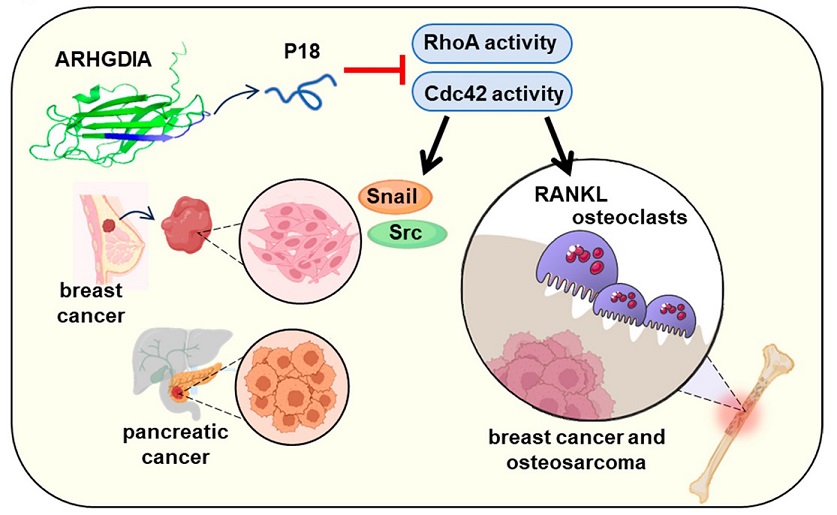Nikhil Prasad Fact checked by:Thailand Medical News Team Jun 16, 2024 10 months, 1 week, 3 days, 3 hours, 12 minutes ago
Cancer News: In a groundbreaking study, researchers from Harbin Medical University-China, Indiana University Purdue University-USA, Chubu University-Japan, Osaka University Graduate School of Medicine-Japan, Indiana University Simon Comprehensive Cancer Center-USA and Indiana University School of Medicine-USA have identified a novel peptide, P18, that shows promise in treating breast cancer and preventing its spread to the bones. This discovery that is covered in this
Cancer News report brings hope to millions affected by this aggressive disease.

Proposed mechanism of antitumor and osteoprotective action of P18.
What is P18?
P18 is a small protein fragment derived from a larger protein called Arhgdia, which plays a crucial role in cellular functions. The research team discovered that P18 can significantly inhibit the growth, spread, and invasiveness of breast cancer cells. Moreover, it works in harmony with existing chemotherapy drugs, enhancing their effectiveness without harming healthy cells.
Why is P18 Special?
Breast cancer often spreads (metastasizes) to bones, leading to severe complications. Current treatments struggle to address this issue effectively. P18 not only targets the cancer cells but also helps protect bones from damage. This dual action makes it a unique and powerful tool in cancer therapy.
Breaking Down the Science - How P18 Works
-Inhibiting Cancer Cell Growth: P18 was tested on various breast cancer cell lines, including aggressive forms like MDA-MB-231 and MDA-MB-436. The results were astounding - P18 reduced the viability of these cells, meaning it effectively killed them or stopped their growth.
-Stopping Spread: Cancer cells need to move and invade other tissues to spread. P18 disrupts this process, significantly reducing the ability of cancer cells to migrate and invade new areas.
-Enhancing Chemotherapy: When used alongside common chemotherapy drugs like Cisplatin and Taxol, P18 made these drugs more effective. This means potentially lower doses of chemotherapy could be used, reducing side effects while maintaining powerful cancer-fighting effects.
-Protecting Bones: Breast cancer cells often stimulate the destruction of bones. P18 inhibits this destructive process, preserving bone health and preventing complications from bone metastasis.
The Journey of Discovery
The discovery of P18 was not accidental. The researchers used advanced techniques to screen a library of protein fragments, identifying those with the strongest anticancer properties. P18 stood out for its potent effects and unique ability to act on both cancer cells and bone tissue.
Looking Ahead - Clinical Tria
ls and Future Applications
While the lab results are promising, the next step is to test P18 in clinical trials. These trials will determine its safety and effectiveness in humans. If successful, P18 could become a standard part of breast cancer treatment, offering new hope to patients worldwide.
A Bright Future
The discovery of P18 is a significant step forward in cancer research. It showcases the power of innovative science to find new solutions to old problems. For those battling breast cancer, P18 represents a beacon of hope, promising more effective treatments with fewer side effects.
Final Thoughts
Cancer research is a field of constant evolution and discovery. The identification of P18 highlights the importance of continued investment in scientific research. Each new finding brings us closer to a future where cancer is no longer a deadly threat but a manageable condition. With P18, that future looks brighter than ever.
Key Takeaways
-P18 is a novel peptide with potent anticancer properties.
-It effectively inhibits breast cancer cell growth and spread.
-P18 enhances the efficacy of existing chemotherapy drugs.
-It protects bones from cancer-related damage.
-Clinical trials are the next step to bringing this promising treatment to patients.
As research progresses, P18 may soon become a crucial component in the fight against breast cancer, offering new hope and improved outcomes for patients around the world.
The study findings were published in the peer reviewed journal: Cancers
https://www.mdpi.com/2072-6694/16/12/2230
For the latest
Cancer News, keep on logging to Thailand Medical News.
Read Also:
https://www.thailandmedical.news/news/new-discovery-mouse-mammary-tumour-virus-mmtv-linked-to-human-breast-cancer
https://www.thailandmedical.news/news/covid-19-s-effect-on-breast-cancer-cells
https://www.thailandmedical.news/news/targeting-key-enzymes-nos2-and-cox-2-to-halt-aggressive-breast-cancer-progression
https://www.thailandmedical.news/news/indonesian-study-finds-soy-based-tempeh-s-isoflavones-can-inhibit-breast-cancer-via-mir-7-5p-upregulation
